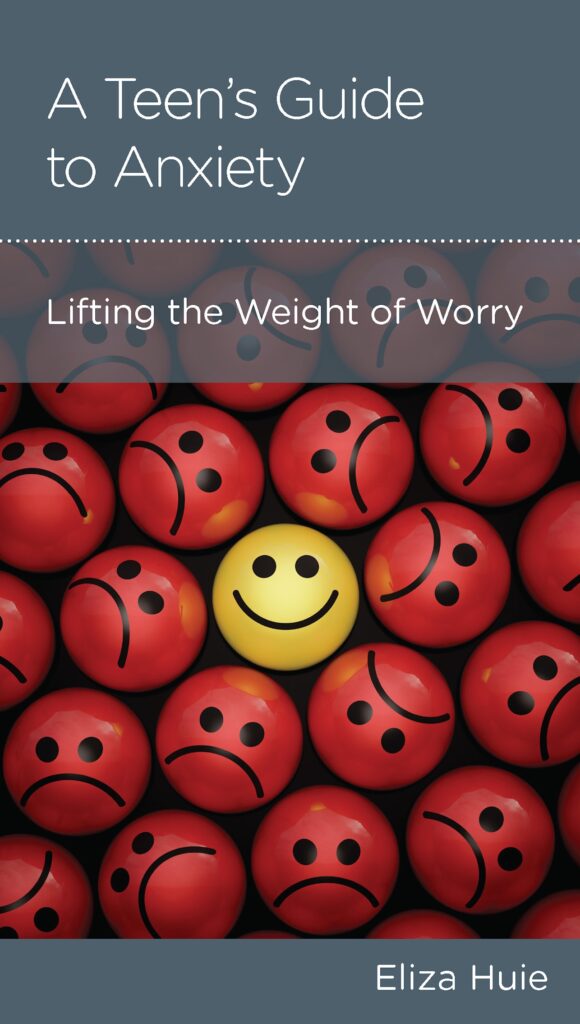If you are reading this, there’s a good chance an adult passed it your way. Maybe it was your mom, dad, a grandparent, a teacher, or your counselor. And yeah, it can be annoying to be handed something you didn’t ask for. I get it.
But before you quit reading, hang with me for a sec.
Let me tell you why I wrote this and, more importantly, why it might actually be worth your time.
I’m a counselor. I’ve sat across the room from students who’ve said things like “I feel like I can’t breathe” or “I can’t get my brain to shut off” or “I don’t even know what I’m so worried about, but it’s like . . . everything.”
So when I was asked to write something about anxiety for teens, I didn’t want to just write about teens. I wanted to write to you.
That’s probably where your well-meaning adult came in. You know, the one who passed this along to you. Let’s just consider them the DoorDash driver. You didn’t order this, but it landed in your hands anyway. And my hope is that by the end, you’ll be glad it did.
Let’s Talk About Anxiety—Like, Actually Talk About It
Here’s the thing: Anxiety isn’t just feeling nervous before a test or getting butterflies before speaking in front of a class. Those things are normal. Anxiety goes deeper. It can show up like this:
- You feel like your mind is always running, but not in a good way.
- Your chest feels tight, and you don’t know why.
- You overthink everything. Things like conversations, texts, what you said, or what you didn’t say.
- You can’t sleep even though you’re exhausted.
- You care too much, and then suddenly, not at all.
Sound familiar?
Stats say that about one in three teens have been diagnosed with anxiety. So the next time you’re in a classroom or at practice, or you’re scrolling group chats, consider that if there are three of you there, someone is carrying anxiety. Maybe that someone is you.
What Are You Actually Anxious About?
Every teen I meet is different, but here are some of the things I hear a lot:
- “I feel like I have to be perfect all the time.”
- “Everyone else seems to have it all together, so why don’t I?”
- “If I don’t get into the right school or land the right job, I’ll disappoint everyone.”
- “What if people find out I’m struggling?”
- “If I had more faith, I wouldn’t struggle so much.”
- “What if the future just . . . doesn’t work out?”
- “I feel like I let God down.”
Whether your anxiety is loud and obvious or quiet and internal, it’s real. And no, you’re not being dramatic. You’re human.
Does the Bible Say Anything About This?
It does. The Bible is honest about hard stuff. It doesn’t pretend anxiety doesn’t exist and it doesn’t say, “Just get over it.”
What it does say is this: “Cast all your anxiety on him because he cares for you” (1 Peter 5:7 niv).
That’s not a guilt trip. That’s an invitation. God wants you to come to him with your worries. God invites us to bring everything to him in prayer. That includes your fears and anxious thoughts. In fact, Jesus himself experienced deep internal anguish (see Luke 22:44), so he gets it. He gets you.
God’s not annoyed by your anxiety. He’s not telling you to tough it out. He’s saying, “Bring it to me. I can handle it. I understand.”
So What Can You Do About Anxiety?
Here are two real steps you can take starting today:
1. Call It What It Is
Anxiety grows in silence. When you name it—“I’m anxious about failing,” “I’m worried they’re mad at me,” “I feel like I can’t keep up”—you start to take its power away. Be honest with God, and be honest with someone who loves you. Tell your parents or a trusted adult. Maybe talk to the person who asked you to read this.
I once heard a quote that says, “Shared joy is a double joy; shared sorrow is half a sorrow.” That is so true, right? When you experience something that makes you really happy and you share it with someone, the joy you feel is even stronger. And when you had a bad day and you share it with someone, it feels a little lighter, knowing they listened and cared.
Don’t keep your anxiety to yourself. Call it what it is and share your struggle with someone who cares about you. You don’t have to be falling apart to ask for help. Talk to a trusted adult, a friend, a youth leader, or maybe a counselor like me.
2. Breathe Like It Matters (Because It Does)
Seriously. Try this! Breathe in slowly and fill your lungs full. Now breathe out, letting all the air slowly empty from your lungs. Do it again two or three times, being sure to breathe slowly. Your nervous system needs this kind of reset when your brain is spiraling.
Bonus step: Add your favorite verse to your breathing. Choose a verse from the Bible that helps you fight discouragement, fear, and temptation. Here is one I like to use:
“When I am afraid, I put my trust in you.” (Psalm 56:3 NIV)
To add the verse to your breathing, just think about one part of the verse as you breathe in, and think of the rest of the verse as you breathe out. It could look like this:
Breathe in slowly and think, “When I am afraid . . .”
Breathe out slowly and think, “I put my trust in you.”
Practice this at different times through the day, like maybe when you are lying in bed at night or when you are waiting for your ride to come. Then when anxiety comes, you’ll have that verse ready to breathe with.
You’re Not Broken. You’re Not Weak. You’re Not Alone.
Thanks for sticking with me here. I have one final thing I want to share. Anxiety isn’t all there is about you. We often say, “I am anxious,” but anxiety is not your identity. You might feel anxious, but it is not who you are.
You are more than the thoughts racing through your head. You are more than the pressure, the fear, the what-ifs, and the tightness in your chest. You were made by a God who sees you and loves you. Yes, he really sees you and knows how hard this struggle is, and he is there with you in it. You are not alone. The Bible says, “God is . . . a helper who is always found in times of trouble” (Psalm 46:1 csb). Hey, that just might be a good verse to breathe with the next time anxiety hits!
So whether this showed up in your hands because someone passed it along to you, or you just clicked out of curiosity, I hope you’ll carry these truths with you: You’re not the only one. You’re not without hope. And you’re not in this alone.
A Teen’s Guide to Anxiety
When you are a teen, it is common to experience anxiety in different areas of your life, whether it be school, sports, or social interactions. Counselor Eliza Huie wants to help you identify anxiety by recognizing common signs and encourages you to share your experience with a trusted adult. She also introduces the acronym N-E-A-R to help you manage anxiety. Anxiety can disrupt life, but you can use these simple tools to help you turn to your God, who is near when things feel overwhelming.






